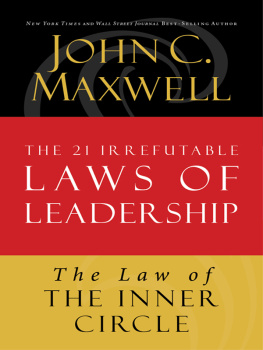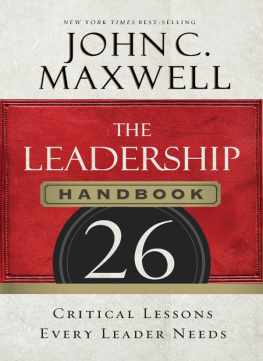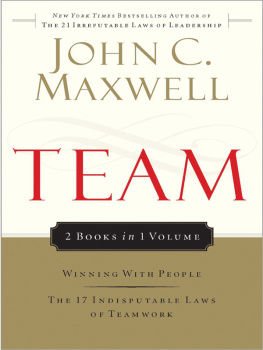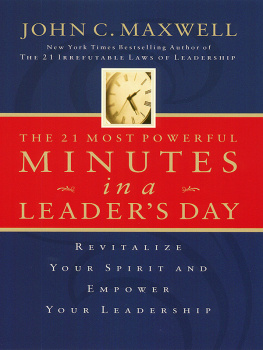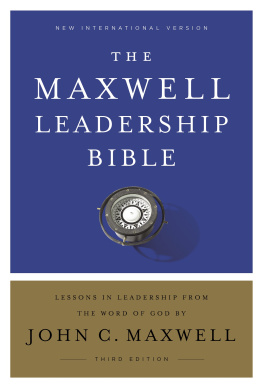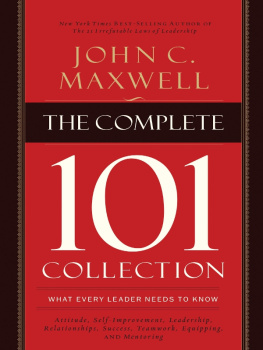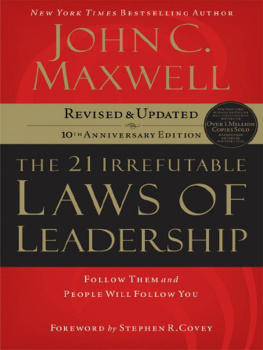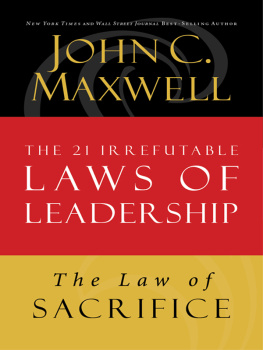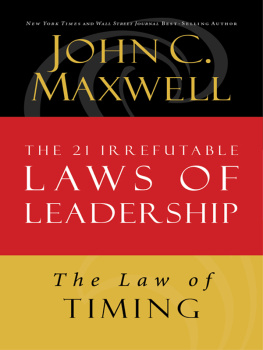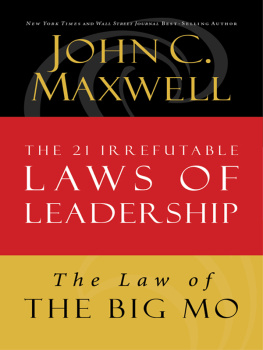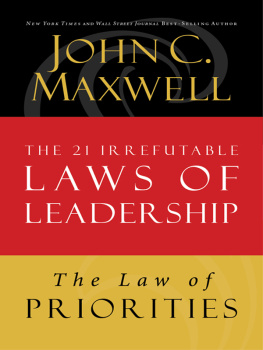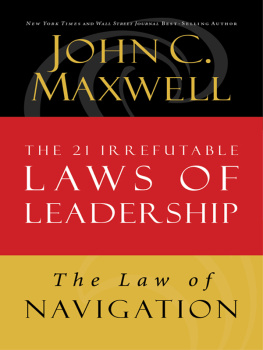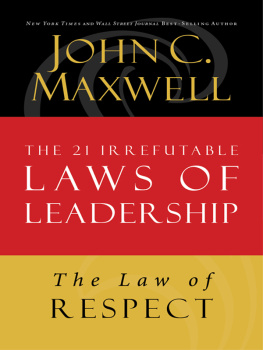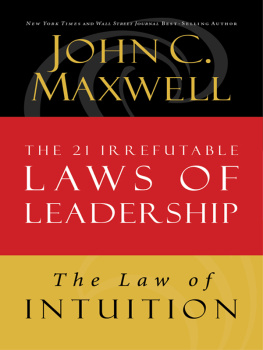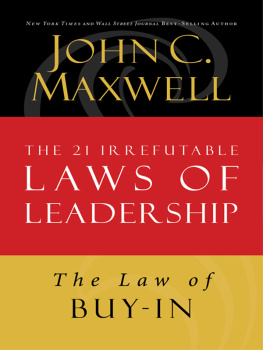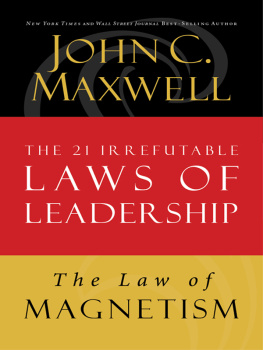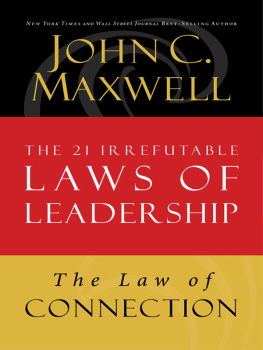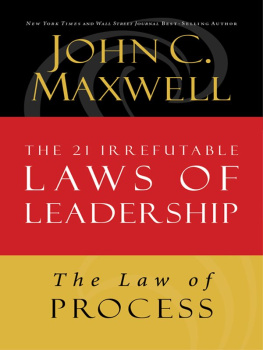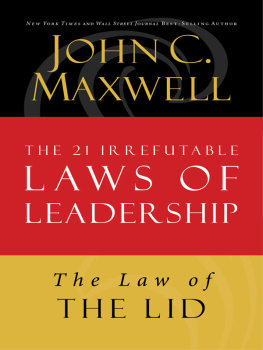
1998 and 2007 by John C. Maxwell
This ebook is derived from The 21 Irrefutable Laws of Leadership, by John Maxwell, 1998 and 2007 by Maxwell Motivation, Inc., a Georgia corporation.
All rights reserved. No portion of this book may be reproduced, stored in a retrieval system, or transmitted in any form or by any meanselectronic, mechanical, photocopy, recording, scanning, or otherexcept for brief quotations in critical reviews or articles, without the prior written permission of the publisher.
Published in Nashville, Tennessee, by Thomas Nelson. Thomas Nelson is a trademark of Thomas Nelson, Inc.
Thomas Nelson, Inc. titles may be purchased in bulk for educational, business, fund-raising, or sales promotional use. For information, please e-mail SpecialMarkets@ThomasNelson.com.
Published in association with Yates & Yates, LLP, Attorneys and Counselors, Orange, California.
Scripture quotations noted CEV are from THE CONTEMPORARY ENGLISH VERSION.
1991 by the American Bible Society. Used by permission.
Scripture quotations noted The Message are from The Message: The New Testament in Contemporary English. 1993 by Eugene H. Peterson.
ISBN 978-0-7852-7431-5 (HC)
ISBN 978-1-4185-3831-6 (ebook)
ISBN 978-1-4002-7570-0 (ebook of Chapter 11)

This book is dedicated to Charlie Wetzel, my writing partner since 1994. Together weve written more than forty books, and Ive enjoyed our collaboration on every one. As I have labored to add value to others by identifying and teaching leadership principles, Charlie, you have added value to me and my efforts. Your insights and skills as a wordsmith have been enjoyed by millions of readers. As a result, you have made a greater impact on more people than has anyone else in my inner circle. For that I thank you.
CONTENTS


Thank you to the thousands of leaders around the world who learned and sometimes challenged the laws of leadership, thus sharpening my thinking.
Thank you to the team at Thomas Nelson who gave me the chance to revise and improve this book, and especially to Tami Heim for her strategic leadership and to Victor Oliver who was instrumental in the development of the original concept.
Thank you to Linda Eggers, my executive assistant, and her assistant, Sue Caldwell, for their incredible service and willingness to go the extra mile every day.
Thank you to Charlie Wetzel, my writer, and Stephanie, his wife, with-out whose work this book would not have been possible.

A Leaders Potential Is Determinedby Those Closest to Him
When we see any incredibly gifted person, its always tempting to believe that talent alone made him successful. To think that is to buy into a lie. Nobody does anything great alone. Leaders do not succeed alone. A leaders potential is determined by those closest to him. What makes the difference is the leaders inner circle.
UNBELIEVABLE TALENT
Lance Armstrong is one of the most talented athletes on the planet. Because of his physical gifts, he has been called a freak of nature. His sport, cycling, is perhaps the most grueling. The Tour de France, which he has won an astounding seven times in a row, has been compared to running twenty marathons on twenty consecutive days. Racers cover approximately two thousand miles of often mountainous terrain in a three-week period. On peak race days, they consume as many as ten thousand calories to provide the energy they need.
Armstrong has become a legend as the conqueror of the Tour de France. Writer Michael Specter provides perspective on Armstrongs ability:
Three types of riders succeed in long stage races like the Tour de France: those who excel at climbing but are only adequate in time trials, in which a cyclist races alone against the clock; those who can win time trials but struggle in the mountains; and cyclists who are moderately good at both. Now there appears to be a fourth group: Armstrong. He has become the best climber in the world... And there is no cyclist better at time trials.
Clearly, Armstrong is in a class that few others can approach. His determination is unquestionable. His training regimen is unmatched. His talent is extraordinary. Yet without a team, he would not have won a single Tour title.
UNBELIEVABLE TEAM
Cycling is truly a team sport, though it may not seem that way to the casual observer. During his Tour de France run, Armstrong had an incredible team. Anchoring the team were Chris Carmichael, his coach; and Johan Bruyneel, an ex-cyclist who functioned as the teams sports director and master tactician. Both men were indispensable, since Armstrong tended at first to follow his own less efficient training regimen and execute his own tactics, causing him to lose badly. But once those two inner circle members were in place, Armstrong began to maximize his gift.
Taking the team approach even further, Armstrongs sponsors and equipment suppliersTrek, Nike, AMD, Bontrager, Shimano, and Oakleywere asked to work together as a group rather than merely contributing as individuals without knowing what the others were doing. It was revolutionary at the time and helped raise the entire team to a higher level. It is now standard practice in professional cycling.
And then, of course, there were the other cyclists who rode with him each year. In 2005, Armstrongs last year, they included Jos Azevedo of Portugal; Manuel Beltrn, Benjamin Noval, and Jos Luis Rubiera of Spain; Pavel Padmos of the Czech Republic; Yaroslav Popovych of Ukraine; Paolo Savoldelli of Italy; and George Hincapie of the United States. I wanted an experienced team for Lances last Tour and that was the determining factor, explained Bruyneel. Each person brought unique skills to the team.
I think we have fielded our strongest team ever with this formation, said Armstrong. It has many consistent elements from years past, like the Spanish armada for the climbs, strong guys like George, Pavel and Benjamin, the Giro winner in Savoldelli plus a guy like Popo (Popovych) with a very bright future. I look forward to leading this team and attempting to give the great folks at Discovery a yellow jersey.
Lance is the first to say he would never have won the Tour de France without the help of his teammates, explains the Team Discovery Web site. Every other rider sacrifices individual glory at the race in order to work for one rider, Lance, which says a lot considering whats at stake. Yet, over the years, Lance delivered every single time following the work of his team, so it goes hand in hand. If the team sacrificed itself and Lance didnt have what it took to come through in the end, we would have had to rethink the plan.
Leaders have to deliver. There is no substitute for performance. But without a good team, they often dont get the opportunity. Their potential is determined by those closest to them. That is the Law of the Inner Circle.
WHY YOU AND I NEED A TEAM
In recent years, people in the business world have rediscovered the significance of teams. In the 1980s, the buzzword in business circles was management. Then in the 1990s, the emphasis was on leadership. Now in the twenty-first century, the emphasis is on team leadership. Why? Because nobody does everything well.
Next page
